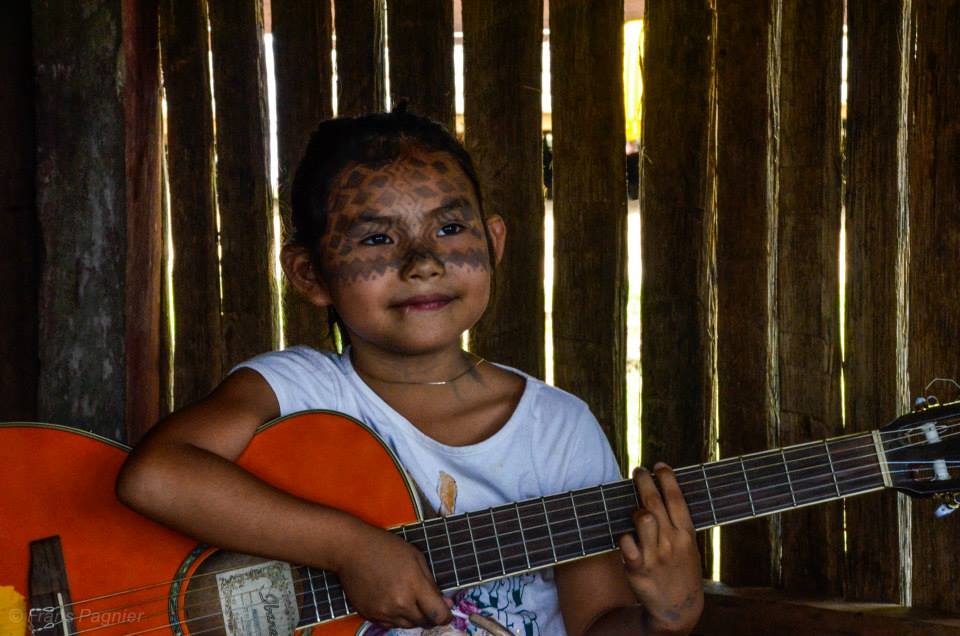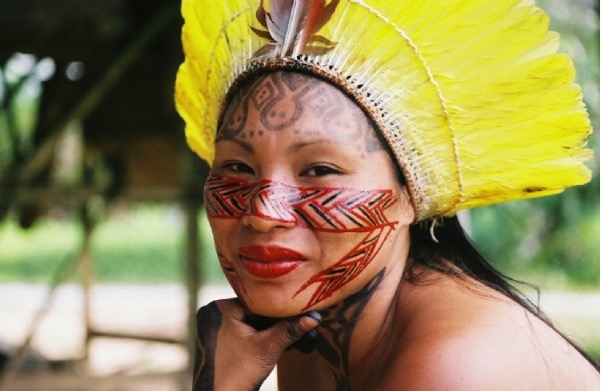Yawanawa Tribe: Keepers of Sacred Rapé and Shamanic Wisdom
Introduction
The Yawanawa, meaning "people of the white-lipped peccary," are an Indigenous tribe of approximately 1,300 members residing along the Gregório River in Acre, Brazil. Renowned for their resilience, spiritual depth, and cultural preservation, the Yawanawa hold a sacred bond with the forest and its plant medicines. Their traditions, deeply rooted in shamanism, have been passed down through generations despite past threats of extinction. Central to their spiritual practices is Rapé—called "Rume" in their language—a sacred snuff used to align body, mind, and spirit.
Rapé and its Role in Yawanawa Spiritual Practices
Rapé plays a central role in Yawanawa spiritual life. Traditionally prepared with finely ground Brazilian Tabacos—such as Sabia, Moi, or Arapiraca—and ashes from sacred trees like Tsunu (Platycyamus regnellii), it serves as a powerful tool for cleansing, grounding, and connecting with ancestral and forest spirits. The Yawanawa believe that Rume helps remove energetic blockages and foster mental clarity. It is frequently used before or during Ayahuasca ceremonies to enhance spiritual insight, calm the mind, and deepen connection to the medicine.
Historically, the first Rapé introduced to Western users was believed to be Yawanawa Rume. Early batches were shipped in repurposed Coca-Cola bottles and labeled with names like "Força," "Meditação," and "Tsunu," referring to their spiritual intention or primary ash ingredient. These early blends were coarse, slightly moist, and revered for their directness and simplicity. This marked the beginning of Rapé’s journey into the global consciousness.
My personal journey with Rapé began with those first unique bottles, and from the moment I experienced its effects, my interest was fully awakened. Within a few years, we became proud pioneers of making Rapé available online—becoming the first shop to do so. The rapid growth of this movement allowed all involved to support one another, build bridges between cultures, and bring a sustainable income to the tribal people. Most importantly, it inspired younger generations within the tribes to value their ancestral wisdom, preserve their languages, and carry forward the spiritual and ecological traditions of their elders.
Rapé Preparation and Cultural Significance
The preparation of Rume is ceremonial. Ashes are produced with care and dedication, ensuring only specific bark types are burned. The process is meticulous: ashes are collected directly after the fire, before morning dew, to ensure they remain pure and dry. Blending occurs with reverence, accompanied by chants or silent intentions. For the Yawanawa, Rapé is not merely a plant preparation but a spiritual companion that guides healing, protection, and alignment.
Prominent Figures: Shaneihu and Nawashahu Yawanawa
Shaneihu Yawanawa is a respected Rapé craftsman and ceremonial musician, known for his grounding blends and spiritual guidance. His compositions often incorporate ancient Yawanawa chants that carry healing frequencies. Nawashahu Yawanawa, daughter of Chief Biraci Nixiwaka and the pioneering female shaman Putani, is a cultural ambassador and Rapé maker in her own right. Her Força Feminina blend is celebrated for empowering the feminine spirit and facilitating emotional balance. Both individuals exemplify the Yawanawa’s living spiritual legacy, bridging tradition and modernity.
Shaneihu Yawanawa and the Album Kanaro
Shaneihu Yawanawa is not only a respected Rapé artisan and ceremonial leader, but also a celebrated musician. His album Kanaro is a deeply moving collection of chants, medicine songs, and sacred melodies that transcend language. Each track carries a distinct spiritual vibration—some echoing the gentle tones of Hindu mantras, others evoking the soulful resonance of North and South American indigenous traditions. The album is a journey through emotion, heart, and ceremony, offering a rich auditory companion for inner work and reflection. To support Shaneihu and experience this music, you can purchase the CD Kanaro here.
Chief Biraci Brasil: Visionary Leader and Cultural Guardian
Chief Biraci Nixiwaka Brasil, father of Nawashahu Yawanawa, is a revered figure in the preservation and revitalization of Yawanawa culture. His leadership has been instrumental in reclaiming tribal sovereignty, rebuilding spiritual practices, and forging alliances to protect the Yawanawa territory. In the aftermath of colonial exploitation and the rubber trade’s devastating impact, Chief Biraci led a cultural renaissance, reestablishing sacred rituals, initiating the first female shamans, and encouraging youth to reconnect with ancestral wisdom.
One of his key achievements has been the development of sustainable agroforestry projects in collaboration with trusted allies. These initiatives, which include the cultivation of açai, coconut, and banana trees, reflect the tribe’s commitment to ecological stewardship and long-term food sovereignty. His efforts have also extended internationally—through cultural exchanges, educational outreach, and the sharing of sacred medicines like Rapé and Ayahuasca—allowing the Yawanawa to inspire and teach beyond their borders.
Chief Biraci’s vision continues to shape a living example of how Indigenous leadership, grounded in spiritual tradition, can build resilience, protect biodiversity, and empower a new generation to carry the flame of cultural survival.
Shamanic Traditions and Sacred Ceremonies
The spiritual heart of the tribe lies with its pajés (shamans), who undergo rigorous initiations involving prayer, isolation, and dieta (spiritual fasting) with sacred plants. Rare initiations include ingesting the rare muca root, reserved only for those becoming warriors or healers. Sacred medicines such as Ayahuasca and Rapé are cornerstones of these initiations. The tribe also uses Kambo (Phyllomedusa bicolor secretion) for physical and spiritual detoxification. Rapé enhances Ayahuasca ceremonies by centering the user, easing nausea, and opening spiritual channels.
The Muka diet—another essential initiation rite—focuses on spiritual purification and isolation. The plant Muka, consumed under strict guidelines, is believed to offer spiritual power and access to ancestral teachings. Ayahuasca ceremonies, known as Uni, guide individuals through deep self-discovery and healing.
Festivals, Music, and Dance
Yawanawa festivals, such as the Yawa Festival, are vibrant expressions of culture, spirituality, and community. These gatherings feature traditional music, the mariri dance, sacred body painting, and ceremonial songs known as icaros. Music and ritual dance serve as vehicles for communion with the forest, ancestors, and spirit world, reinforcing community bonds and cultural identity.
Environmental Stewardship and Current Challenges
Guardians of the Amazon, the Yawanawa view the forest as sacred. Their ecological knowledge supports sustainable agriculture, hunting, and fishing practices. In partnership with allies, they have launched agroforestry projects planting açai, banana, and coconut trees—promoting sustainable land use across their 200,000-hectare territory. However, external threats such as illegal logging and oil exploitation persist. The Yawanawa collaborate with NGOs and global allies to protect their land and share their environmental message with the world.
Global Recognition and Cultural Revival
Internationally respected for their cultural wisdom, the Yawanawa actively share their knowledge through ceremonies, educational exchanges, and advocacy for Indigenous rights. Their spiritual leaders, including Hushahu Yawanawa—the first initiated female shaman—are breaking new ground while preserving ancient traditions. Through partnerships and projects rooted in reciprocity, the Yawanawa are ensuring their culture thrives and adapts.
Conclusion
The Yawanawa tribe continues to inspire with their deep spiritual connection, sacred plant knowledge, and commitment to environmental and cultural preservation. Their Rapé blends—particularly those containing Tsunu and Cumaru ashes—serve as gateways to ancestral healing and inner alignment. By engaging with the Yawanawa traditions, one not only accesses profound spiritual tools but also participates in honoring the living heritage of the Amazon.
Notable Rapé Blends from the Yawanawa Tribe
Yawanawa Canela do Velho
Yawanawa Ceremony
Yawanawa Cumaru
Yawanawa Daime
Yawanawa Grey
Yawanawa Kapakuru
Yawanawa Moy
Yawanawa Mulateiro
Yawanawa Nawashahu
Yawanawa Parika
Yawanawa Pau Mulata
Yawanawa Pau Pereira
Yawanawa Peu
Yawanawa Shaneihu
Yawanawa Tonka
Yawanawa Tsunu
Disclaimer
The information provided above is for historical, educational, and scientific purposes only. It should not be interpreted as a recommendation for the specific use of our products. Any statements about traditional uses are informational. The use and application of our products are the customer's decision and responsibility.
Copyright Notice
All content, including this article, is protected under copyright law. Any unauthorized reproduction, distribution, or use of this material is prohibited. Duplication of this content, in whole or in part, without written consent, is a violation of copyright regulations.

Fig. 2
Yawanawá child playing the guitar in Acre

Fig. 3
Hushahu Yawanawa
Copyright: www.4real.com